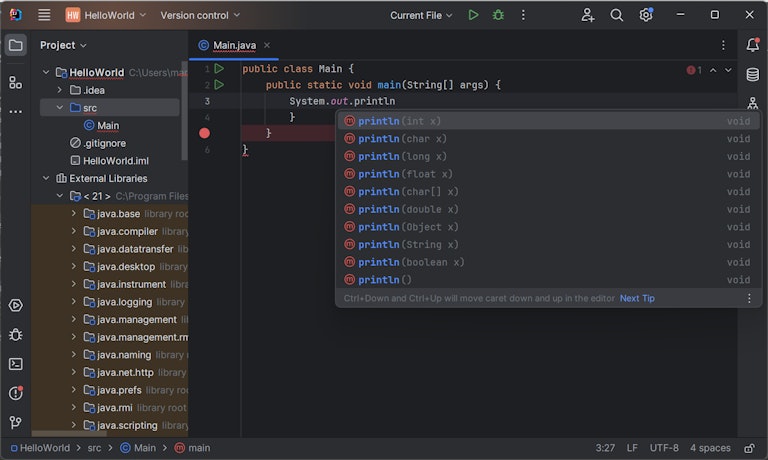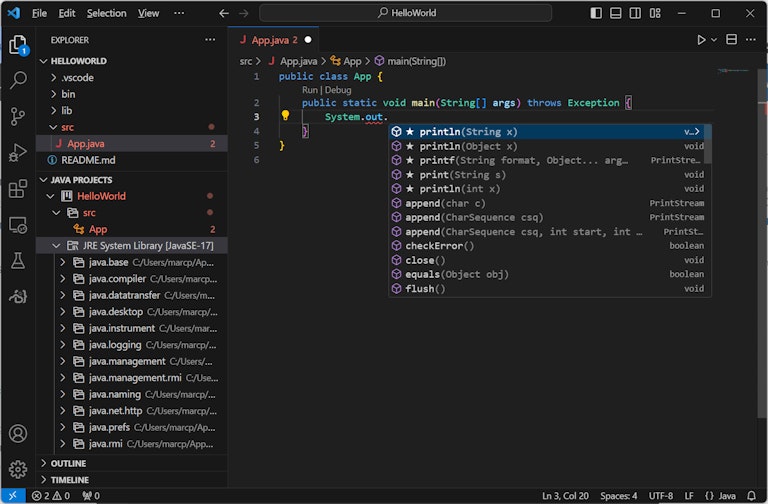Java Development is Changing
Two big players are making moves to attract more Java developers with the cloud

There are good reasons why IntelliJ IDEA is the go-to IDE for large Java and Kotlin teams. It was built from the ground up for Java development. Nobody else matches the intuitiveness and smoothness of IntelliJ IDEA’s contextual symbol searching and refactoring.
Until recently, that’s all developers expected. Today, cloud-based development is changing the playing field for enterprise development tools. That opens an opportunity to fill the needs of large Java teams who want more of the advantages of cloud-based development.
Microsoft, the other big player, is showing signs of recognizing this opportunity for VS Code. They’re on the other side of the field with an IDE that’s built from the ground up to work in the cloud and a roster of promising Java partnerships on their team.
Why do Java developers want remote development?
A cloud-based development solution gives Java teams more capabilities. At Coder, we’ve seen large dev teams benefit the most from:
- Shared indexing: Large Java projects use massive resources. A developer waits several minutes while their IDE generates an index for a project and its dozens, or even hundreds, of sub-projects. A shared index leverages cloud storage to mitigate this issue.
- Developer productivity: Developers can not only onboard faster, they can choose the tools they prefer while still using the same set up that their teammates are using.
- Reduced resource usage: Our users have seen incredible drops in their cloud compute spending. Unlike on-prem hardware, you can spin cloud services on demand and shut them down when they’re idle.
- Geography is not an obstacle: A remote dev team isn’t limited by their location. Cloud service providers cover the globe with their high-performance, low-latency infrastructure.
- Reproducible setups: Set up complex configuration, dependencies, and test cases once so that the whole team can share.
- Industry-standard security: Cloud providers have solved the challenges of providing their services securely. There’s no need to risk breaches by reinventing the security wheel.
Team JetBrains

Java developers who choose the familiarity and productivity of JetBrains’ tools are waiting for better integration of cloud development features. While JetBrains has been steadily improving its cloud-based offerings, their tools aren’t quite there yet. Some features are limited, like IntelliJ IDEA’s inability to open more than one remote window. Other features show promise, but are bulky or difficult to set up, like shared indexes or running in secure enterprise networks.
There’s also Fleet. Still in public review, Fleet is a “next-generation” IDE that JetBrains is positioning to compete with VS Code. From Coder’s perspective, none of our customers have asked about it, so we still have no idea where it will eventually stand in the market.
Team Microsoft

On the other side, VS Code has a big head start in cloud-based development but less sophisticated Java support. Instead of focusing on a single programming language, Microsoft’s VS Code relies on a vibrant ecosystem of extensions and related infrastructure. Microsoft is starting to leverage this for Java. Look at VS Code extensions like Red Hat's Language Support for Java. What’s more interesting is Microsoft’s partnership with Oracle for the Oracle Java Platform Extension.
Python and Android developers are already migrating
This might be history repeating. We’ve already seen the Python and Android developer communities make moves to the cloud. Microsoft appears to be under the same incentives to attract Java developers. It’s our understanding that Java is the largest slice of the cloud development pie.
Pylance is the Microsoft extension for VS Code that finally convinced many Python developers to move to VS Code. Pylance gives them both solid Python support and full-featured cloud-based development.
The most popular IDE for Android development is Android Studio, based on IntelliJ IDEA. But Android Studio doesn’t support remote ssh connections. Consequently, many Android teams have switched to IntelliJ IDEA for better cloud development support. It’ll be interesting to see if Microsoft can attract them too.
And the winner is
JetBrains and Microsoft are warming up for a head-to-head competition, and we’re happy to say that the eventual winners are big Java teams. JetBrains exquisitely supports Java development and is strengthening its cloud development features. Microsoft and its ecosystem partners are making moves from the opposite direction. We can be sure, though, that one or the other isn’t enough anymore for large Java dev teams.
Start a 30-day trial of Coder Enterprise
If you would like to try our premium version of Coder, which includes all of the collaboration, security, governance, and management features, please visit https://coder.com/trial to sign up.
Subscribe to our newsletter
Want to stay up to date on all things Coder? Subscribe to our monthly newsletter and be the first to know when we release new things!


